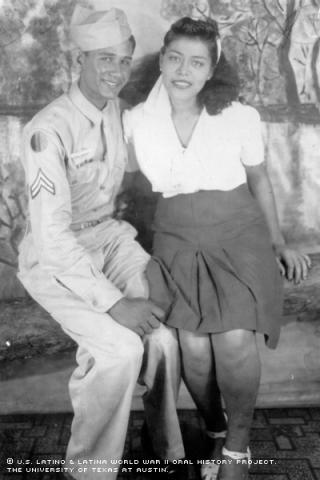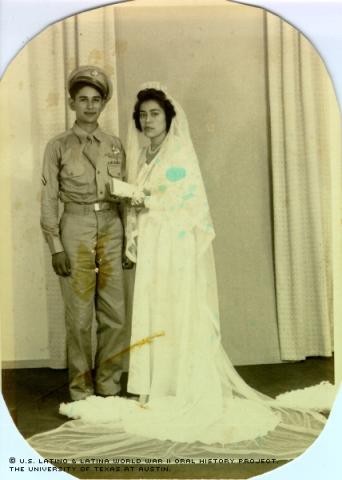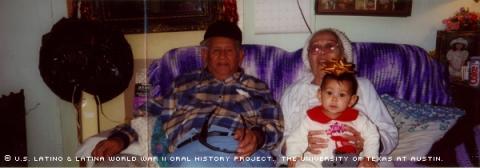


By Antonio Gilb
In the first days of the Battle of the Bulge in 1944, in Schmidt, Germany, American scouts reported that a division of German tanks and soldiers lay on the outskirts of town, ready to attack. To minimize casualties, officers hastily ordered the unit to abandon the area. But in their haste, the unit commanders left behind a handful of soldiers. Catarino Hernandez, an 18-year-old from Seguin, was among them.
Hernandez was among the first American soldiers at the Battle of the Bulge in Schmidt, Germany, on Nov. 9, 1943. He and his comrades were left to take shelter in a basement as American fighter planes bombed the city. After three days, the inevitable occurred: One of the bombs hit the basement, hurting Hernandez and other soldiers hiding.
He blacked out. The next image Hernandez remembers is German guns pointing straight at him. Hernandez, who spoke a little German, knew the soldiers wanted to kill him. In the days before his unit's evacuation, he and his American comrades had killed German soldiers in battle.
"Anybody that tells you they're not scared," said Hernandez, "is lying or crazy in the head."
A German officer promptly made sure Hernandez was treated as a prisoner of war. The Germans took him to the backlines. For the next six days, he lived in a small jail, where Germans interrogated him, unsuccessfully trying to extract intelligence from him. After those six days, the Germans packed Hernandez into a railroad car. He was boxed in for a week with no food and little water, so his weight dropped from 125 pounds to under 100. Life in the camps was stressful and taxing. Food was scarce. Soldiers were lucky to sleep three hours a night in beds covered with locusts and other bugs.
It was a difficult time.
"I don't want to talk about it and ever remember it," Hernandez said. "Now I'm okay. I can talk about it, but I want to forget it as much as I can."
In May of 1945, the Germans freed Hernandez. The period marked him, however: He suffered posttraumatic stress syndrome and suffered from nightmares for several decades. Time finally healed the psychological wounds, but he prefers not to dwell on that experience.
Catarino Hernandez, Jr. was born in 1924 in Seguin, Texas, to Catarino and Stella Henandez. He was one of eight brothers and seven sisters raised on the family farm. He had a good childhood, although he got into trouble sometimes. Like the time when he was a child and rode a wild horse; his mother spanked him. Or the time he tied up an uncooperative cow while milking her; the cow fell over.
Hernandez remembers constantly being busy -- if he wasn't occupied milking the cows, he was feeding the roosters; if he wasn't picking cotton, he mended fences. It was a peaceful life.
"You always have somebody to play with, somebody to fight with," he said.
His education stopped at grammar school; any more schooling would have been a luxury.
Hernandez married Elvira Valdez in July of 1945. A few months later, he was drafted.
"You didn't need that much school to make a living," Hernandez said. "Having so many kids, there's no way the old man [his father] could afford it."
Hernandez came home after the war and never left Texas. He took whatever jobs he could to make ends meet: picking cotton, mending fences.
"You pick up one day here, another day there. You didn't know what happens the next day," he said. "You had enough food for today; but what about the next day?"
There was the unlucky winter of 1955, when his oldest daughter went to the hospital, his car broke down and he broke his leg in an accident. He wasn't able to buy the children presents. Fortunately, somebody from the school gave one of the daughters a tree.
Finally, he ended up with a job in construction. Among his projects was building barracks at Kelley Air Force Base in San Antonio. He worked with the same company until his retirement in 1984.
"They say, 'I bet you went to hell," Hernandez said. "I say, 'I went to hell and back.'"
Mr. Hernandez was interviewed in San Antonio, Texas, on October 13, 2001, by Antonio Gilb.

